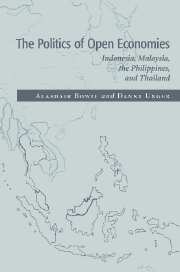2 - Southeast Asian economic growth: the international context
Published online by Cambridge University Press: 10 November 2009
Summary
The international economic and strategic environments have presented both opportunities and constraints for growth and economic development in the Southeast Asian region. Exploiting these opportunities successfully has required some degree of openness, at least to foreign technology and foreign markets. As the cases of Japan in the 1950s and 1960s and South Korea into the 1980s make clear, however, success has not required full openness of capital and trade regimes.
This chapter presents a broad overview of the changing global and regional context for Southeast Asian development during the postwar years, and discusses how that context has shaped economic possibilities and affected economic openness among the ASEAN Four. We discuss the economic, political, strategic, and international institutional forces at work. We reserve for chapters 3 through 6 a more detailed and analytic consideration of the impact of the external environment on state policymaking and business planning in the individual countries. In those chapters, we also describe the nature of specific policy responses and seek to explain the reasons for individual countries responding to the external context in particular ways.
The initial section of this chapter concentrates on the Japanese and, in particular, US roles in shaping the context for early postwar Southeast Asian development. These include US commitment to the containment of communism, backed by high levels of US aid and military spending, and establishment of an open international economy featuring rapid growth and trade expansion.
- Type
- Chapter
- Information
- The Politics of Open EconomiesIndonesia, Malaysia, the Philippines, and Thailand, pp. 25 - 43Publisher: Cambridge University PressPrint publication year: 1997



